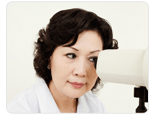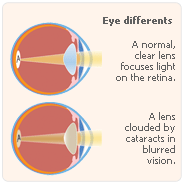
When a woman stops menstruating her estrogen levels drop significantly. Estrogen is responsible for maintaining proper health in women, so as estrogen decreases women undergo a plethora of unpleasurable symptoms. Recently included in these symptoms is the development of cataracts. As the development of cataracts increases more in women than men of the same age, it is believed that the absence of estrogen may be the cause. A study was conducted to determine the relationship between postmenopausal estrogen hormone therapy and the capacity to develop cataracts.
In the United States, cataract surgery is the most frequently performed surgical procedure. Accordingly, age-related cataract can cause visual impairment and even blindness. As this problem is a significant one, much research is needed to determine how to combat cataracts in the aging population. One such study was conducted. The results of the Framingham Heart Study and the Framingham Eye Study were combined to analyze the relationship between the loss of estrogen and the development of a possible symptom of menopause, cataracts.
estrogen cataracts

As the prevalence of cataracts is increased in postmenopausal women compared to men of the same age, it is believed the reason is because of dropping levels of estrogen. Estrogen may be responsible for retarding the formation of cataracts. 653 women participated in a biannual analysis since 1973. Their ages ranged from 66 to 93 years. Of the participants, 529 (64%) were non-estrogen users and 191 (36%) were estrogen users. Among the estrogen users, 43 women had taken estrogen for 10 years or more.
Adjustments were made for age at menopause, type of menopause, age at eye examination, body mass index, diabetes, hypertension and cigarette smoking.
After reviewing the participant's biannual results, it was concluded that longer duration of estrogen use was associated with a lower risk of cataract development. Women who had taken estrogen for 10 years or more experienced a significantly lower risk than non-estrogen users. The findings also reported that estrogen use protected against not only cataracts, but other lens opacities.
The conclusions of this analysis once again serve to show some of the benefits associated with postmenopausal estrogen use. Replacing estrogen that the body has naturally lost with age is a great way to ward off potential side effects that occur in postmenopausal women. As estrogen use is not without its own side effects, it is important that a woman consult her doctor when considering taking estrogen.